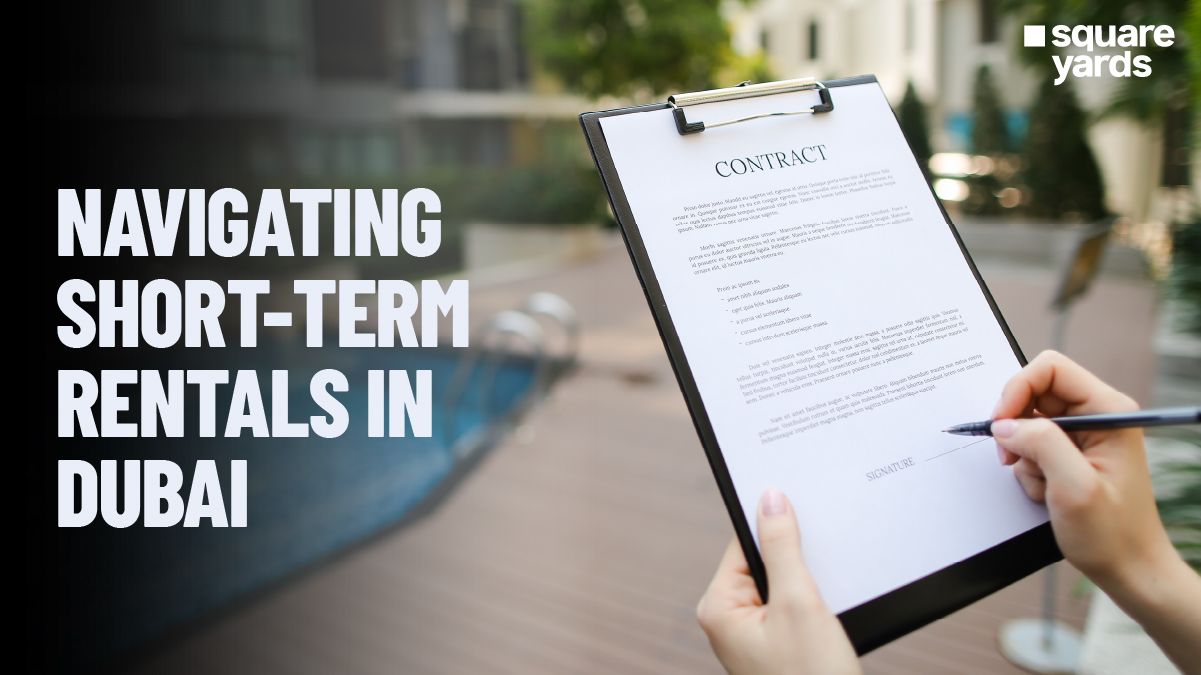Short-term rentals in Dubai are accommodations leased for periods shorter than the standard Dubai rental contracts. Unlike long-term leases, these contracts accommodate visitors, business travelers, or residents seeking flexible living options without long-term commitments. Dubai’s booming tourism and business sectors make short-term rentals popular. They are often furnished and equipped with amenities that provide a comfortable, home-like environment. Let’s move forward and take a closer look at short-term rentals in Dubai and explore all aspects related to this topic.
What is a Short-Term Rental?

In Dubai, a short-term rental typically refers to furnished apartments, holiday villas, serviced apartments, or any residential property available for lease from a few days to several months. These rentals are governed by specific Dubai rental laws that require owners to obtain a license, ensuring compliance with safety and quality standards. The Department of Economy and Tourism oversees the licensing, aiming to maintain high standards across all short-term accommodations.
Advantages of Short-Term Rentals in Dubai
Some of the benefits of Short-term rentals in Dubai include–
- Flexibility and Convenience: Ideal for tourists and temporary residents.
- Cost-Effective: Often cheaper than hotels, especially for longer stays.
- High Demand: Driven by Dubai’s rich tourism industry and frequent business events
- Opportunity for Property Owners: The short-term rental market presents a lucrative opportunity.
- Guest Benefits: The rooms offer more space and privacy than typical hotel rooms, making them a ‘home away from home’ experience.
What Are The Types of Units Eligible for Short-Term Lease in Dubai?
Dubai offers a variety of properties suitable for short-term leasing, each catering to different needs and preferences. Here are some short-term rental Dubai options–
- The main types include furnished apartments, popular among business travellers and tourists for convenience and ready-to-live-in setup.
- Vacation rentals, often located in tourist-favored areas like Jumeirah Beach and Dubai Marina, provide luxurious amenities such as private pools and beach access.
- Serviced apartments offer hotel-like services, including housekeeping, which appeals to those seeking a hassle-free stay.
- Short-term villas are ideal for larger groups or families looking for privacy and space. They often feature private gardens and pools.
Short-Term Rental DTCM Permit in Dubai
To legally operate a short-term rental in Dubai, owners must secure a permit from the Department of Tourism and Commerce Marketing (DTCM). This process involves applying with required documents such as Emirates ID, title deed, and recent utility bills to demonstrate eligibility and compliance.
The DTCM assesses these submissions to ensure the property meets safety and quality standards before granting a holiday home license. Property owners are encouraged to maintain these standards, as regular inspections can occur to uphold Dubai’s reputation for high-quality accommodation.
-
Steps Step Process to Get a Short-Term Rental Permit in Dubai
Here are the steps for obtaining a short-term rental permit in Dubai:
-
- Gather Necessary Documents–
- Valid Emirates ID or passport
- Title deed
- Recent utility bill
- Fill Out Online Application– Log in to the DTCM portal and complete the form with property specifics such as location, amenities, and maximum occupancy.
- Submit Application– Submit the completed application form online
- Pay Fee– Pay the required permit fees mentioned on the website.
- Property Inspection– DTCM officials may inspect the property.
- Issuance of License– A holiday home license is issued upon completion.
- Annual Renewal– The license must be renewed annually
- Gather Necessary Documents–
-
Total Permits Allowed for a Single Landlord
Dubai has rules about how many permits a single landlord can have to operate short-term rentals. To maintain quality control and adherence to local regulations, each landlord can only register several properties under a single license. A commercial trade license can be necessary for landlords who want to grow their businesses beyond this point. This strategy ensures fair competition and respect for safety regulations while preserving a balanced and regulated environment within Dubai’s rental market.
Expense Included Obtaining a Short Term Rental Permit in Dubai
The cost of obtaining a short-term rental permit in Dubai varies depending on the type and size of the property. The fees are structured to cover the administration of regulations and inspections required to maintain property standards. These fees include a one-time setup fee and annual renewal fees, which are pivotal in sustaining the regulatory framework that supports Dubai’s tourism industry. The DTCM’s official website or customer service channels provide a specific fee for each property type, ensuring transparency and accessibility for potential and existing landlords.
|
Fee Type |
Description |
Amount (AED) |
|
Registration Fee |
Individual operator registration |
1,520 (1,500 + 10 knowledge fee + 10 innovation fee) |
Property Permit Charges: Costs and Requirements

Dubai’s legal framework for short-term rentals is designed to ensure a secure and high-quality experience for both guests and landlords. The regulations include registration and permit requirements that all property owners must follow to operate legally. Key aspects include the mandatory collection of the Tourism Dirham Fee, calculated based on the property’s classification and the length of stay.
New QR code regulations have been introduced to enhance guest security and streamline check-in. They require properties to register each guest with the DTCM shortly after arrival.
|
Fee Type |
Description |
Amount (AED) |
|
Permit Fees |
Studio or 1-Bedroom |
370 |
|
2-Bedroom |
670 |
|
|
3-Bedroom |
970 |
|
|
4-Bedroom and Above |
1,270 |
Registration and Permit Criteria For Short Term Rental in Dubai
To operate a short-term rental in Dubai, every property must be registered with the Dubai Economy and Tourism. This process is crucial to ensure that all rental properties meet specific safety, quality, and operational standards, maintaining Dubai’s high standards in its tourism sector. The registration includes detailed documentation of the property, adherence to local building and safety codes, and alignment with community rules, which often govern noise levels and guest behaviour. These requirements uphold the integrity of residential areas and enhance the guest experience, fostering a positive reputation for Dubai’s tourism.
Tourism Fee (AED) and QR Code Regulations
One key regulatory aspect of running a short-term rental in Dubai is the Tourism Dirham Fee, a mandatory charge collected from guests. The fee varies based on the property’s classification and size. It must be reported and remitted monthly to the Dubai Department of Tourism and Commerce Marketing.
Recent regulations also require QR codes for each rental property. These codes streamline the check-in process and ensure that guest information is quickly and securely registered with the DTCM, enhancing overall security and compliance.
|
Fee Type |
Description |
Amount (AED) |
|
Tourism Dirham Fee |
Standard Property – per room per night |
10 |
|
Deluxe Property – per room per night |
15 |
|
|
Additional Fees |
Knowledge Fee (per transaction) |
10 |
|
Innovation Fee (per transaction) |
10 |
Operating Your Short-Term Rental: Best Practices
Successfully operating your short-term rental in Dubai involves several key practices.
-
- First, properties should be listed on reputable online platforms to ensure visibility to potential guests. It’s important to accurately describe your property, showcasing its best features while being transparent about any limitations.
- Guest screening and verification are essential to maintain safety and compliance with local laws.
- Regular property management and maintenance are also crucial, ensuring that each guest arrives at a clean and functioning home.
- Understanding tax implications and securing appropriate insurance coverage is vital for protecting your investment and ensuring compliance with local regulations.
-
Tax Implications
There is generally no tax implication for a monthly short-term rental in Dubai, but property owners must adhere to specific tax-related obligations. The most significant is the Tourism Dirham Fee, which varies based on the property’s classification and property owners must collect it from guests. Owners must register with the Federal Tax Authority to obtain a tax registration number, although no traditional income tax applies to the rental income.
-
Insurance Considerations
Insurance is crucial for short-term rental owners in the Dubai rental market. Comprehensive coverage for property damage, guest injury liability, and loss of rental income mitigate risks for both owners and guests. Owners should seek policies specifically designed for short-term rentals to ensure complete coverage.
Common Challenges Faced In Short-Term Rentals In Dubai
Handling short-term rentals in Dubai can present several challenges. Compliance with the extensive regulatory framework is often the foremost concern, as failure to meet these standards can result in penalties. Managing guest expectations and maintaining property standards consistently also pose challenges, particularly during peak tourist seasons when turnover is high and maintenance needs can escalate. Working with the competitive Dubai rental market requires effective marketing strategies and differentiation to attract and retain guests.
What’s Best Suggested?
- Regular updates on local laws and regulations are crucial to avoid penalties.
- Create regular maintenance and cleaning schedules to keep properties in good condition.
- Use strong booking and communication tools to improve guest interactions and satisfaction.
In The End
As Dubai grows as a global tourist and business hub, the demand for short-term rentals is expected to increase. Property owners can capitalise on this trend by focusing on delivering exceptional service and amenities that meet the expectations of international visitors, using property management software and online marketing tools to increase efficiency and reach a broader audience, and incorporating eco-friendly practices and amenities to appeal to environmentally conscious travellers. Property owners can enhance their offerings by addressing these key areas, staying competitive in a bustling market, and ensuring a profitable and sustainable short-term rental business in Dubai.
Similar Suggestions For You:
|
Guide to Dubai Rental Properties |
|
|
About the RERA Rental Calculator Dubai |
|
|
Guidelines of Dubai Rental Market |
|
|
About Filing a Rental Dispute in Dubai |
|
|
Terminate Dubai Rental Agreement |
Frequently Asked Questions (FAQ’s)
The Dubai Department of Tourism and Commerce Marketing (DTCM) regulates short-term rentals in Dubai. Owners must comply with regulations, including obtaining a holiday home license, adhering to safety and quality standards, and ensuring that properties are registered and meet specified requirements .
Tenants should be aware that short-term leases are typically for periods less than a year and are subject to specific rules, such as the need for fully furnished and equipped properties. Tenants must also understand their rights and responsibilities, including payment terms and conditions regarding deposits and cancellations .
A short-term rental in Dubai is legal, provided the property owner obtains the necessary permits and licenses from the DTCM. This includes complying with all regulatory requirements and ensuring the property meets all specified guest safety and comfort standards.
Legal requirements include registering the property with the DTCM, obtaining a holiday home license, ensuring compliance with safety and quality standards, and paying the Tourism Dirham Fee. Property owners must also ensure that all guest accommodations are appropriately classified and listed .
Property owners must collect the Tourism Dirham Fee from guests, which varies depending on the property's classification and size. While rental earnings are not taxed, registration with the Federal Tax Authority (FTA) for a tax registration number is required .
Challenges include staying compliant with changing regulations, managing high guest turnover, maintaining property standards, and dealing with the competitive market. Effective guest communication and property management are crucial for overcoming these challenges .
Typically, if you are staying in the property, it cannot be rented out as a short-term or vacation rental. Short-term rentals in Dubai must be vacant and available exclusively for guests during their stay .
The cost of acquiring a DTCM permit for a short-term rental can vary depending on the property type and location. The fee includes a one-time setup fee and annual renewal fees. Specific fee details can be obtained directly from the DTCM .
Property owners and tenants should contact the Dubai Department of Tourism and Commerce Marketing for more detailed information and specific queries. They provide guidance, regulatory information, and application procedures for short-term rentals . What laws govern the short-term rental markets in Dubai?
What should tenants know about short-term leases in Dubai?
Is it legal to operate a short-term rental in Dubai?
What are the legal requirements for operating a short-term rental in Dubai?
What are the tax implications of short-term rentals in Dubai?
What are the potential challenges of operating a short-term rental in Dubai?
Can I stay on the same property and leave it out as a vacation home?
What is the cost of acquiring a DTCM permit?
Who should be contacted for more information on short-term leases in Dubai?




